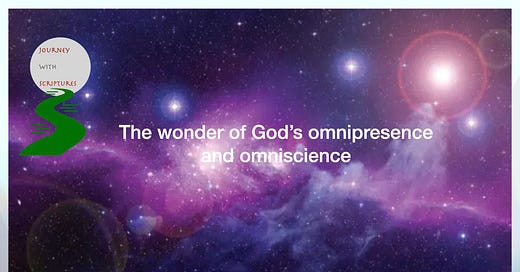The wonder of God’s omnipresence and omniscience
November 13, 2023 - Monday, 32nd Week in Ordinary Time
Psalm 139:1b-3, 4-6, 7-8, 9-10
Psalm 139 is a powerful exposition of God’s omnipresence and his omniscience. From a biblical perspective, God is directly involved in the affairs of his creation and we cannot flee from his presence. In the Book of Chronicles, we read: “For the eyes of the LORD run to and fro throughout the whole earth” (2 Chron 16:9a).
The psalmist begins by acknowledging God’s searching knowledge of human beings. It includes knowing what we do, where we are, and even what we think. This knowledge fills the psalmist with wonder: “Such knowledge is too wonderful for me” (Ps 139:6). Then, the psalmist eliminates any possibility of escaping God’s omnipresence. Since God’s Spirit permeates everything, it is impossible to find a place where God is not present. He is present even in the realm of the dead (Ps 139:8). Saint Paul captured this truth in one of his memorable saying that in God “we live and move and have our being“ (Acts 17:28).
Belief in God’s omnipresence and his omniscience has important implications for life. First of all, it implies that nothing happens without God's knowledge or beyond His reach. This is evident in the entire biblical story from Genesis to Revelation. The selling of Joseph by his brothers is a classic example in the Old Testament. Joseph interpreted the evil action of his brothers as playing a part in God’s plan of saving their entire family from famine. He said to his brothers: “God sent me ahead of you to preserve for you a remnant on earth and to save your lives by a great deliverance” (Gen 45:7). In the New Testament, Jesus’ death is presented in the same way. Jesus was handed over into the hands of Jewish religious leaders and Roman authorities to be crucified. But, his death brought salvation to the whole world. Thus, for biblical authors, God is the ultimate ruler of all things. The question is: do we see the affairs of the world and our individual lives in the same way?
Belief in God’s omnipresence and his omniscience leads to belief in God’s providence. In our Catechism, we read: “The witness of Scripture is unanimous that the solicitude of divine providence is concrete and immediate; God cares for all, from the least things to the great events” (CCC, 303). But, God’s providence also includes his guidance of the world’s history towards the ultimate fulfilment of his plan of salvation. Again, let us turn to our Catechism for the explanation of this aspect of divine providence. “Creation has its own goodness and proper perfection, but it did not spring forth complete from the hands of the Creator. The universe was created 'in a state of journeying' (in statu viae) toward an ultimate perfection yet to be attained, to which God has destined it. We call 'divine providence' the dispositions by which God guides his creation toward this perfection" (CCC, 302).
God’s omnipresence and his omniscience are the foundation of prayer life. Saint John Chrysostom captured it in this beautiful statement: ”The Creator of the universe dwells in our hearts. I have travelled the world and met many people, but never have I found another shrine as beloved as my own soul." It is also a source of confidence that God will never abandon us. St. Pio wrote to his spiritual children: “God is always with you, guiding and protecting you, even in the darkest moments”.
Let the truth of God’s loving presence, knowledge, and providence expressed in Psalm 139 be a source of comfort and inspiration for us. With God on our side, so intimately close to us, there is nothing to fear.




